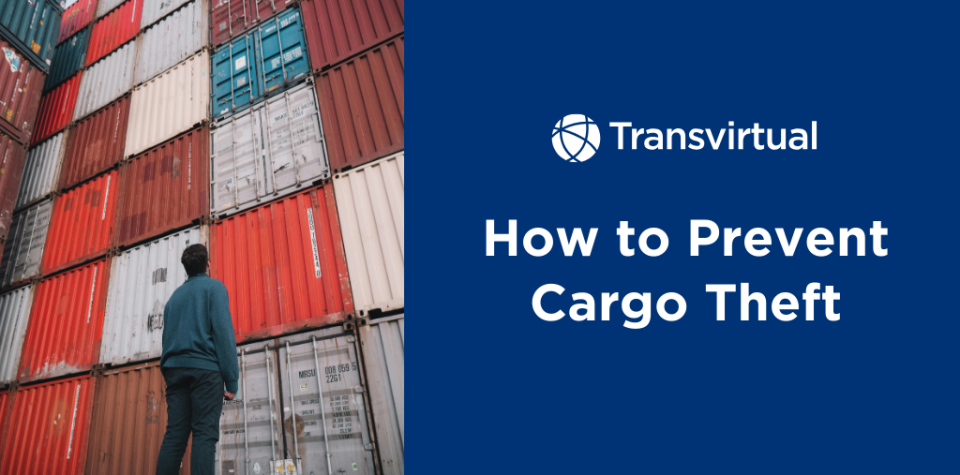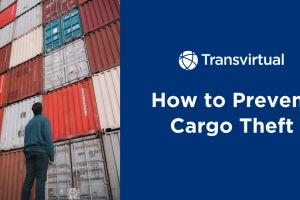Table of Contents
Cargo theft is surging, costing the United States billions annually and disrupting the global supply chain. From stolen Nintendo consoles to hijacked egg shipments, the rise in these incidents demands immediate action. Discover the latest cargo theft tactics fleet professionals should be aware of and get actionable strategies to protect your shipments and strengthen your defenses against this growing threat.
The Rise of Cargo Theft in the Fleet and Shipping Industry
In June 2025, a trailer truck transporting over 2,800 Nintendo Switch 2 consoles worth $1.4 million was stolen en route to Texas. A few months earlier, 280,000 eggs worth $100,000 were shipped off to Florida, but didn’t reach their destination despite their timely departure. Unfortunately, these stories are part of a surging trend. Cargo theft costs the U.S. up to $35 billion per year. Reports show 505 incidents in the first quarter of 2025, which is 36% higher than the previous year’s first quarter. Sophisticated theft tactics, inadequate government regulations, and record-high tariffs further exacerbate the issue. The sharp rise has been a consistent trend for the past few years, with a 33% increase in the second quarter of 2024 compared to the previous year. There’s a more alarming surge between November 2022 and March 2023, when cargo theft cases increased by more than 600%.
The Impact on the Global Supply Chain
Many supply chain companies operate beyond borders and across oceans. Cargo theft on a global scale results in significant losses with wider-reaching consequences, such as higher consumer prices and product shortages. Shipping businesses that fail to protect their cargo from theft are considered unreliable, which harms current and future opportunities. Financial loss is a given, but it goes beyond the stolen goods. Besides shouldering replacement costs and insurance premiums, freight companies must boost security measures and investigate the incident. These expenses may result in higher costs for consumers if businesses raise prices to offset their losses. Cargo theft disrupts the shipping industry and all who rely on it. If the client’s products end up on the black market, it can tarnish their reputation. Brands that sell perishables are also at a higher risk, as their goods can expire before they’re sold, resulting in bad press.
Tips to Protect Your Cargo and the Global Supply Chain
Here are some strategies to help you fortify your defenses against cargo theft, maintaining the integrity and stability of the global supply chain:
1. Understand Common Cargo Theft Tactics
Cargo theft can happen at any point while a shipment is in transit. Ensuring your team is aware of common and emerging cargo theft trends will make detecting and responding to suspicious activities easier. Here are the cargo theft tactics everyone should know:
Straight Cargo Theft
When cargo is physically stolen from a location or transport vehicle, it is considered straight cargo theft. This is common in places where cargo is left unattended, such as roadside parking, drop lots, parking lots, truck stops, and storage facilities. Thieves often target refrigerated trucks because they carry valuable perishables, like pharmaceuticals and food products. They also target drivers who make many stops before reaching their destination.
Pilferage
Pilferage involves taking only a part of the cargo. Because only a few items disappear, it can go unnoticed, or drivers may not know when it happened, which makes them reluctant to report it. However, reporting these incidents is essential since it helps maintain crime statistic accuracy and can assist in returning the stolen property.
Strategic Cargo Theft
Thieves use fraudulent tactics and fictitious pickups to trick brokers, shippers, and carriers into releasing cargo to them instead of the legitimate receiver. They can use one or a combination of the following methods to steal the shipment:
- Stolen carrier identities
- Forged documents
- Double brokering scams
- Fraudulent carriers
- Insider information
Cyber-Enabled Theft
Technology is a double-edged sword in the supply chain industry, as it empowers both businesses and criminals. Cargo thieves use cyberattacks like phishing emails to steal cargo details, pick-up information, and other sensitive logistics data. Having copies of documents makes fictitious pickups appear legitimate. Some create false documents to intercept loads and reroute shipments to high-risk locations. Hold quarterly meetings to refresh your team’s knowledge of these cargo theft tactics and how to handle them. You can also hire personnel dedicated to detecting high-risk spots and supply chain crime trends in the areas your fleet covers. These experts keep everyone informed and help them recognize and report suspicious activity.
2. Boost Security Assets and Policies
To prevent straight cargo theft, avoid leaving loaded trailers and trucks unattended, especially in the first and middle mile and high-risk locations. Require drivers to complete walk-around inspections after every stop to check for tampered doors and seals. Also, set clear reporting protocols for suspicious activities or incidents. Cargo thieves also target modal yards and warehouses for equipment, especially when they’re in isolated areas or left empty after hours. Expensive equipment or vehicles that transport high-value items are particularly prone to theft. To prevent theft in storage facilities, implement stringent access controls and real-time surveillance systems. You can also set up perimeter fencing to regulate entry and conduct regular security checks to deter thieves. Investing in durable security devices, like heavy-duty locks, also goes a long way in securing vehicle doors in and out of the facility.
3. Implement Stringent Verification Protocols
Before the cargo changes hands, conduct rigorous identity checks and validation processes. Verify every carrier’s credentials. Take photos of the driver’s license plate and the cargo vehicle’s license plate, model and logo. Documenting these details will make it easier to report incidents if needed.
4. Reinforce Cybersecurity
Work with experts to ensure your system can repel cyber attacks. Reduce digital risk by communicating only through secure channels. Regular audits also help detect and investigate discrepancies that might be hiding malicious activities. One wrong click by anyone connected to your system can give hackers a foothold into your operations, so teach every team member how to spot phishing attempts and other cyberattacks. Train them to report all unusual activity, whether they spot it in an email or while they’re on the road.
5. Leverage Technology
GPS trackers help track stolen vehicles. However, many cargo thieves know this and hide their location with GPS jammers or dismantle the device altogether. Using several technologies to monitor your shipments gives you several ways to prevent and respond to cargo theft. Technologies that can optimize your operations and prevent cargo theft include:
- Biometric verification systems: Requiring facial recognition and fingerprint scans makes it hard for cargo thieves to commit identity theft.
- Digital identity verification: This system automatically checks the identity of everyone involved in the shipment process.
- Geofencing technology: This can create virtual boundaries around your operating areas. They will alert you if a vehicle or cargo leaves the predefined area. Depending on the setup, it can also notify security personnel to investigate.
- Artificial intelligence: AI only takes a few seconds to analyze data from your cargo management systems to determine transport patterns and vulnerabilities. AI-powered surveillance systems can also alert personnel immediately in case of cargo theft.
- Blockchain technology: Blockchain runs on a decentralized system, ensuring every transaction is recorded and unchangeable. It makes it easy to detect unauthorized changes and verify the identities of everyone involved in the transport process.
Stay Ahead of Theft and Fraud
Cargo theft has devastating effects on the global supply chain. Fortunately, you can protect your fleet company with proactive security measures. Train your team to recognize cargo theft, implement stringent verification protocols, and optimize your operations with technology to protect your fleet from thieves.

